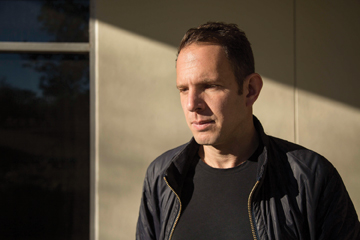
Remember the telephone game? Here’s a refresher: First, a group of people form a line. One person whispers something into another’s ear.
Then that person whispers it into a third person’s ear. And so on. The last person gets the whispered message and then says it aloud to the group. Everyone hears — and oftentimes laughs — at how the message changed from the original. This process of hearing things and then changing what was heard has special significance for composer Yotam Haber.
The Canada-based Azrieli Foundation (azrielifoundation.org) recently awarded Haber its Azrieli Commission for Jewish Music, a prize of 50,000 Canadian dollars (nearly $38,000). He is one of three winners of the foundation’s 2020 Azrieli Music Prizes. The Commission “is awarded to the composer who displays the utmost creativity, artistry and musical excellence” in answering the question, ‘What is Jewish music?’ ” according to the foundation’s website (bit.ly/2Pw3ZEb).
Through the commission, Haber, who is Jewish, will compose a piece for voice and ensemble titled “Estro Poetico Armonico III.” The piece will continue baroque composer Benedetto Marcello’s “telephone game of hearing and rehearing music he transcribed in a Venice Synagogue, and remembering and misremembering,” the foundation said. “I’ll be setting modern Israeli poetry to music,” Haber told The Chronicle in an interview. “I’m still looking for that.” He is required to complete the piece by August 2020, and it will be performed in October 2020 by the Nouvel Ensemble Moderne in Montreal, he said.
Marcello was born in 1686 and died in 1739. While living in Venice, he would visit the Italian city’s main synagogue, Haber said. He would sit in the back row and transcribe what he heard. “He wasn’t Jewish; he was Christian, but he was very interested in this music,” Haber said. “He wrote a series of 50 psalms for voice and instrumental music — similar to cantatas — based on the music he heard. This is the music that God gave the Jews on Mount Sanai — he wrote this in the preface to this music. This is unverifiable and most likely false. “So much is lost when music is not notated, and this wasn’t,” he said. “It was passed down orally. But I love that he wrote that, and I love the fantasy of that idea. That’s sort of what I’ve been doing for the past 10 years.”
Haber recounted that Roman Jews had come to Rome after their expulsion from the Jewish temple. They remained segregated in Rome until the death of Italy’s deposed dictator, Benito Mussolini, in 1945. “Their musical traditions stayed very much unencumbered by other music,” he said. “Jewish Romans pride themselves on having music that is very pure — their words. So, I’ve been writing this cycle of music based on their traditions. … I’m grappling with that history and tradition but at the same time infusing it with my own voice, my own contemporary approach.”
Haber is the associate professor of composition at the UMKC Conservatory, where he started teaching in August 2019. “I’ve known the composition faculty (at the UMKC Conservatory) for many years,” he said. “It’s a world class, very important faculty at UMKC.” Haber lives in New Orleans and has been commuting between there and Kansas City. He plans to move to Kansas City in January 2020. He also is artistic director emeritus of MATA, a nonprofit organization founded by Philip Glass and dedicated to commissioning and presenting new musical works by young composers worldwide. RAI Trade publishes Haber’s music. Haber is 43. He was born in Holland and grew up in Israel, Nigeria and Milwaukee.
He received a bachelor’s degree in music composition from the Indiana University School of Music and a doctorate in music composition from Cornell University. The Azrieli Foundation is the philanthropic legacy of the late David J. Azrieli and has funded institutions and programs in Israel and Canada since 1989, according to its website. The foundation UMKC Conservatory’s Haber wins Azrieli Commission for Jewish Music defines Jewish music, for the purpose of the Azrieli Music Prizes, “as broadly as possible, taking into account the rich and diverse history of Jewish musical traditions, as well as music by Jews and non-Jews, which may be said to incorporate a Jewish thematic or Jewish musical influence.” “Jewish themes may vary broadly, and can include biblical, historical, liturgical, secular and/or folk elements,” according to the website.
“Fundamentally, the Foundation encourages an understanding of Jewish music as deeply rooted in history and tradition, yet forward-moving and dynamic. As such, it encourages themes and content drawn from contemporary Jewish life and experience.” The jury for the Azrieli Commission for Jewish Music comprises “some extremely distinguished musicians whom I deeply, deeply admire,” Haber said. “To receive a prize like this from such an extraordinary group of individuals is meaningful and a great honor,” he said. “It’s an award that has international awareness and importance (and is) extremely useful in my life as a composer.”


